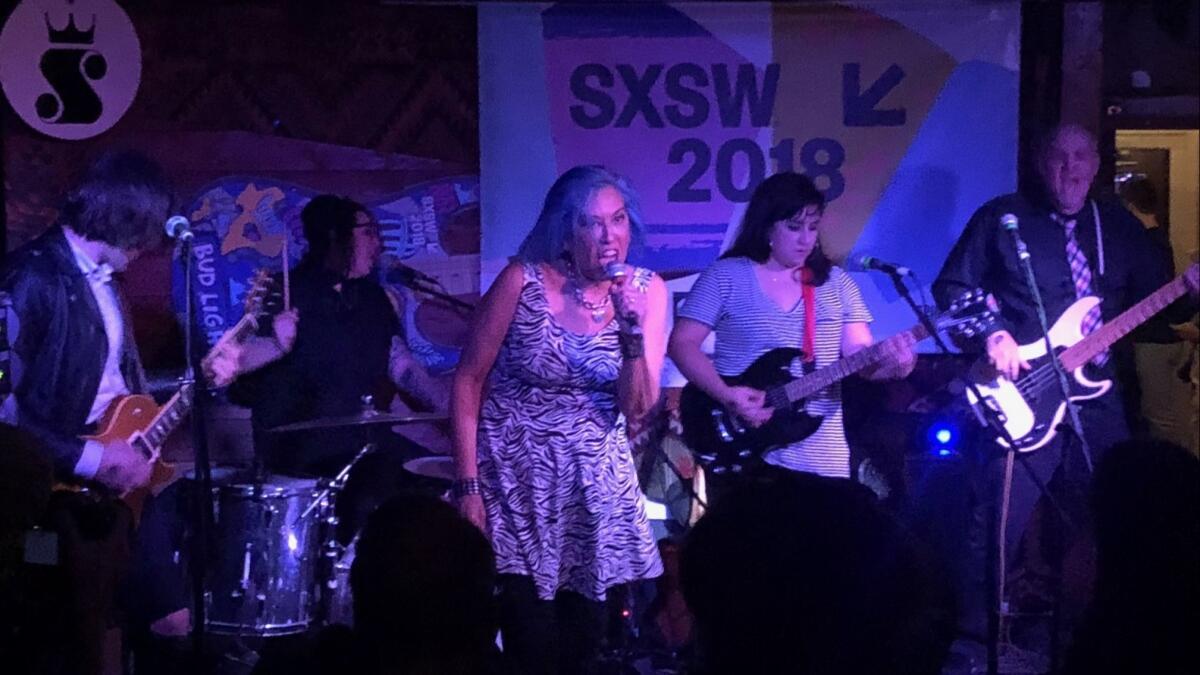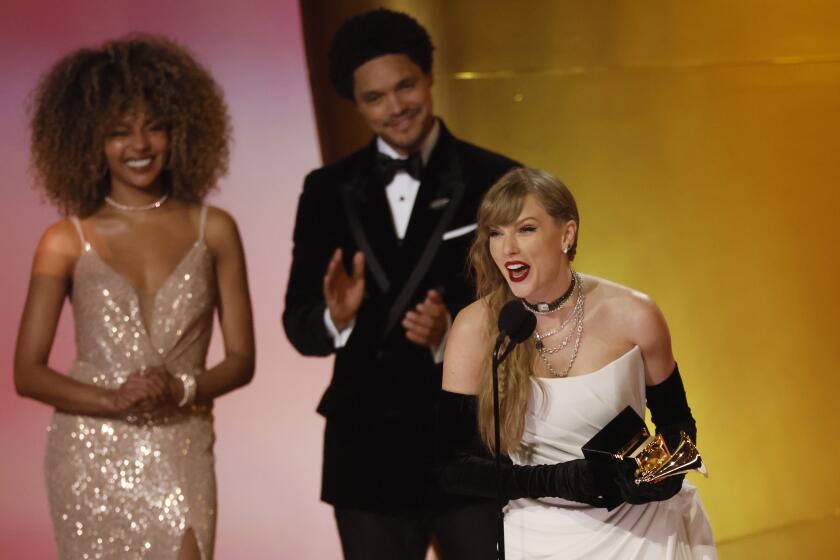At the SXSW Music Festival, outrage is in the air

Reporting from Austin, Texas — “All these old men,” snarled Mac McCaughan of Superchunk at one of the first major concerts of the South by Southwest Music Festival, “won’t die too soon.”
That vicious line hails from the longstanding indie rock band’s new song “I Got Cut,” aimed at politicians who have worked to limit women’s reproductive rights. It also reflected the mood in the early going of this year’s event. With well over 2,000 bands expected to descend here this week for one of the industry’s most visible conferences and festivals, a sense of unrest hung in the air.
While past SXSWs have regularly focused on the ever-shifting nature of digital distribution, inside-baseball business chatter in 2018 was taking a backseat to social and cultural responsibility. Industry talks over the next three days will hit on subjects such as harassment, diversity and gender wage gaps throughout the music community.
Listen to L.A. Times Entertainment’s podcast, The Reel »
Even a largely cheery hour-long talk Wednesday morning from Google/YouTube’s global head of music and longtime industry veteran Lyor Cohen, which primarily emphasized the executive’s love of hip-hop, couldn’t avoid the current #MeToo and Time’s Up environment.
As a onetime leader of Def Jam Recordings, Cohen worked closely with the label’s founder Russell Simmons, who has seen nearly a dozen women came forward in media reports accusing the hip-hop mogul of rape and sexual misconduct over three decades.
“I want to acknowledge the awful allegations that have been made about Russell,” Cohen said. “There’s no question Russell and I were very close. We didn’t just work together, we were roommates and we stayed friends and partners ever since. I never saw him aggressive or violent with any women.
“It’s not the Russell that I know,” he continued. “I’m deeply troubled about all the allegations, and there is absolutely no room for this type of behavior.”
While Cohen drew laughter with amusing tales of learning on the job while tour managing Run-DMC and conceded that Google and YouTube are late to the party in launching a streaming service to take on Apple Music and Spotify, his statement regarding Simmons was the only moment that inspired applause from Austin crowd.
One thread that was becoming clear at SXSW: Whether galvanized by the post-Weinstein era or the election of Donald Trump, a long liberal and rebellious sector of the entertainment industry was about to become more vocal.
McCaughan, whose Superchunk was never overtly political over its three decades of crafting exuberant pop-punk, said in a Wednesday session that the band didn’t set out to make a protest record with its recently released “What a Time to Be Alive.” But in 2018, he noted, it’s unavoidable.
“It would have been weird to not acknowledge what’s happening,” he noted. “It’s not so much, ‘I need to address this and people are waiting to hear from Superchunk about the political situation in our country.’ No one is waiting for that.
“It’s songs about living now. It’s not a record that’s going to make Paul Ryan wake up one day and go, ‘What an idiot I’ve been this whole time,’ but … for people who listen to the record and enjoy the record, they can be listening to it because [they] love rock music, or listen to it and feel, like, ‘Oh, good, I’m not the only one who feels so anxious all the time about the state of the world.’”
Laura Ballance, who co-anchors Superchunk and indie label Merge Records with McCaughan, theorized that when artists opt not to speak out on political and social issues, it’s more complex than just a simple fear of losing fans. Instead, she said, she’s heard from acts on her label that the instant-outrage of today’s social media has made some reticent to join the conversation.
“This is a tricky time,” she said. “The internet has enabled a weird aggression people can have when they’re anonymous. We were tying to get people to do a series of videos to save the [Affordable Care Act], and one of our artists didn’t want to do it because she was afraid it would make her a target to trolls, to hate.”
One artist who doesn’t care: Alice Bag. Once a fixture on the Los Angeles punk scene of the 1970s, Bag’s career has been revitalized as she nears 60, and she’s as angry and outspoken as ever.
Tuesday night she and her band raged through songs from her upcoming album, “Blueprint,” including the ferocious “77,” which tackles gender pay inequality with a can’t-take-it-anymore exasperation.
Furious? You bet, but Bag also made clear that these songs are about building a community. As she said when she introduced “Reign of Fear,” written immediately after the 2016 election, “Even if you don’t know it, that’s OK. It’s about feeling it.”
Follow me on Twitter: @toddmartens
More to Read
The biggest entertainment stories
Get our big stories about Hollywood, film, television, music, arts, culture and more right in your inbox as soon as they publish.
You may occasionally receive promotional content from the Los Angeles Times.











